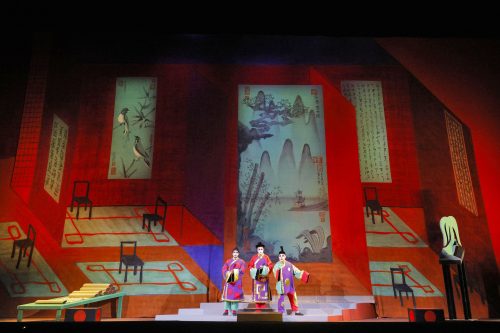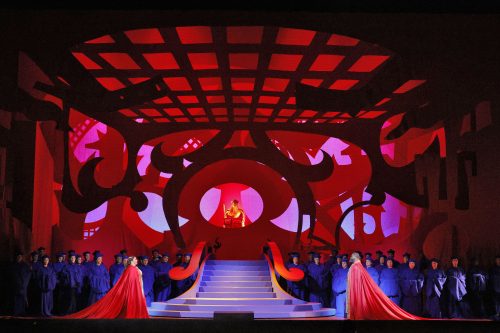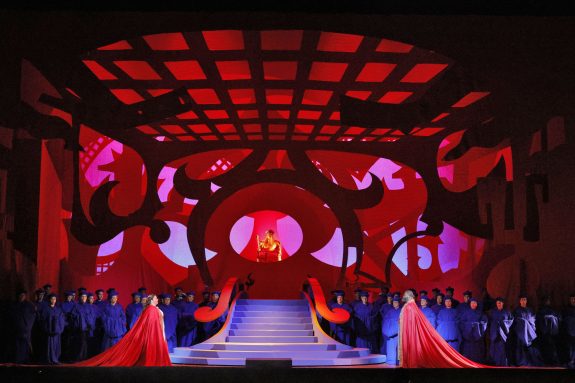 United States Puccini, Turandot: Soloists, Chorus and Orchestra of LA Opera / James Conlon (conductor). Dorothy Chandler Pavilion, Los Angeles, 18.5.2024. (JRo)
United States Puccini, Turandot: Soloists, Chorus and Orchestra of LA Opera / James Conlon (conductor). Dorothy Chandler Pavilion, Los Angeles, 18.5.2024. (JRo)

Production:
Director – Garnett Bruce
Sets – David Hockney
Costumes – Ian Falconer
Original Lighting – Thomas J. Munn (revived by Gary Marder)
Chorus director – Jeremy Frank
Children’s Chorus director – Fernanda Malvar-Ruiz
Choreographer – Kitty McNamee
Cast:
Turandot – Angela Meade
Calaf – Russell Thomas
Liù – Guanqun Yu
Timur – Morris Robinson
Ping – Ryan Wolfe
Pang – Terrence Chin-Loy
Pong – Julius Ahn
Mandarin – Alan Williams
Emperor Altoum – Ashley Faatoalia
The orchestra was ravishing, and the singing of the principals outstanding. The sets and costumes, which hail from a San Francisco production first mounted in 1993 but new to Los Angeles, were delightful. Why then did LA Opera’s Turandot feel unsettled? The fact that Puccini died before completing the opera is, of course, the predominant factor.
In music, literature or visual art, an unfinished work that is posthumously performed or published has problems. Whether Puccini’s Turandot, Fitzgerald’s The Loves of the Last Tycoon or El Greco’s altarpiece, The Vision of St. John, to name a few, the final form never quite satisfies. Puccini envisioned a concluding love duet between Calaf and Turandot as the ultimate moment of the opera, with much the same import as the love duet from Tristan und Isolde. Without this, the opera ends somewhat abruptly (the final duet and closing scene used in this production were supplied by Franco Alfano and abridged by Toscanini).
But beyond this, the plot of the opera presents a complicated set of hurdles to overcome in any production. Calaf loves Turandot, the icy, murderous princess whose main characteristic is an unwholesome fear of men because her ancient ancestor was ravaged by a Tartar. Her rage manifests itself in an oath to behead any suitor who fails to answer the three riddles she poses. This might sound like a Grimm fairytale, but the libretto was inspired by Carlo Gozzi’s eighteenth-century commedia dell’arte play. That, however, was a comedy which acknowledged the absurdity of a man who could love a monster like Turandot.
The illogical nature of Calaf’s love for Turandot is even more pronounced with Puccini’s addition of the character of Liù – the slave girl who protects and accompanies Calaf’s blind father, Timur. She is a sympathetic, virtuous woman who loves Calaf and is willing to sacrifice herself for him. Like Mimì, she draws us to her, and the wonder is why Calaf would not prefer her to Turandot.

What is needed to counteract this puzzle is chemistry between Calaf and the princess. Calaf eschews riches and power, and his only motivation is his love for Turandot – despite the fact that when he first lays eyes on her, she has just presided over the beheading of another suitor. Unfortunately, there was no chemistry between the pair. Even in the third act, when Calaf melts the heart of the princess with a passionate embrace, Russell Thomas and Angela Meade hugged like two awkward, embarrassed children.
What they lacked in attraction, they made up for in singing. Meade has enough vocal power to be heard over Puccini’s use of a massive chorus and orchestra. What I missed in her robust and vibrant rendering of the princess was some modulation and color in her voice, which seemed to stay at a high-octane level throughout. Perhaps she is better suited to a role like Norma, performed here in 2015 (and featuring Thomas as Pollione), where beyond her obvious ability to project her voice, her agility and lyricism had room to spread.
Thomas needed to compete with Meade’s intensity, and it felt at times as if they were taking part in an Olympic event. He did not disappoint in the world’s most beloved and popular aria, ‘Nessun dorma’, producing a lush, full-bodied sound with a warmth that finally made plausible his love for Turandot.
As the emotional center of the opera and its true heroine, Guanqun Yu in the role of Liù was unimpeachable. Her voice had a finely honed beauty. As for her acting, her love for Calaf was palpable, her sacrifice heartbreaking.
Morris Robinson as Timur, Calaf’s father and the exiled king of Tartary, possessed a quiet dignity befitting the blind, helpless king. The beauty of his voice is omnipresent in any role he inhabits, and his noble stature, juxtaposed with the slight frame of Yu, only added to the pathos of his character.
Costumes by famed illustrator, Ian Falconer (creator of the Olivia books and numerous New Yorker covers) were charming, imaginative and colorful. However, the stately robes and princely garments of Calaf and Timur were perplexing. They are persecuted men who have lost their lands in war and been ravaged by the hardships of exile. Tattered costumes are the norm, but most likely Falconer could not resist dressing them in the sumptuous purple and gold that befit their former stations.
The costumes and makeup design had such whimsical appeal that I wished artist David Hockney had toned down his sets to let the dazzling characters stand out. The sets have a definite fairytale ambiance, but they were such an intense red that the singers were often overshadowed by vibrating color. Cut-out abstractions of palace architecture were more two-dimensional than sculptural, and the set design forced the chorus to the edge of the stage, creating a cramped feel to the action.
The most effective set was the Chinese scroll backdrop for the first scene in Act II. The vivid backdrop set off the antics of the three ministers, Ping, Pang and Pong, characters pulled from Gozzi’s play: they retain their fanciful commedia dell’arte roots in the opera. Ryan Wolfe, Terrence Chin-Loy and Julius Ahn offered the needed comic relief, but their singing felt thin. As the lead minister, baritone Wolfe struggled in the higher registers. They fared better in Puccini’s notable scherzo, delivered superbly by the LAO Orchestra, when the three sang fondly of the homes they had left behind.
The orchestra under James Conlon was awash in the luminous colors of Puccini’s score and was a majestic force, as was the chorus under the direction of Jeremy Frank. More dominant than in any of Puccini’s operas, the chorus – a character in itself – alternately thirsted for blood, offered compassion and commented on the action. Both the orchestra and the chorus gave thrilling performances.
Jane Rosenberg

We got to enjoy it last Wednesday!
I’d posit that the hug between Angela Meade and Russell Thomas was awkward and embarrassed because they are both too large to get sufficiently close enough to convey the intimacy required. I would agree that the Hockney sets are way too bright and colorful for the plot and distract from the singing.